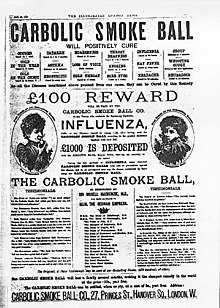
In English contract law, an agreement establishes the first stage in the existence of a contract. The three main elements of contractual formation are whether there is (1) offer and acceptance (agreement) (2) consideration (3) an intention to be legally bound.
One of the most famous cases on forming a contract is Carlill v Carbolic Smoke Ball Company,[1] decided in nineteenth-century England. A medical firm advertised that its new wonder drug, a smoke ball, would cure people's flu, and if it did not, buyers would receive £100. When sued, Carbolic argued the ad was not to be taken as a serious, legally binding offer. It was merely an invitation to treat, and a gimmick. But the court of appeal held that it would appear to a reasonable man that Carbolic had made a serious offer. People had given good "consideration" for it by going to the "distinct inconvenience" of using a faulty product. "Read the advertisement how you will, and twist it about as you will," said Lindley LJ, "here is a distinct promise expressed in language which is perfectly unmistakable".
- ^ Carlill v Carbolic Smoke Ball Company [1893] 2 QB 256
© MMXXIII Rich X Search. We shall prevail. All rights reserved. Rich X Search
